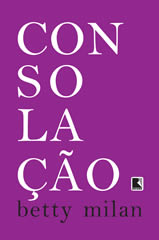
excerpt
Death separates spouses, but those who truly love, it does not separate. Do you remember that first meeting? July 14… Île Saint Louis. You told me you were a tourist and I answered, “No, Laura, you’re from here. Ubi bene, ubi patria. You’re safe with me. We walked around the city. Holding hands and certain nothing could separate us. Even though neither you nor I knew why. Your wish was mine, though I spoke one language and you another. When the bateau-mouche passed by, you said, “An illuminated centipede.” I didn’t understand, but I knew that I needed to learn your tongue to give you mine. To learn you from top to bottom so that our nationality would be that of love.
synopsis
A Brazilian married to a Frenchman, Laura witnesses the agony and death of her husband in a Paris hospital, trying in vain to persuade the doctor to cut short the patient’s suffering. After the funeral, she flies to São Paulo, the city where she was born and with which she maintains a love/hate relationship.
There, surprisingly, Laura does not go to her family home, unable to bear the idea of hearing “my sympathies” and being pitied. Instead, she heads directly from the airport to the cemetery, where she speaks to the living and the dead, whose voices she hears. Mario and Oswald de Andrade, the writers who because of their independence and their relationship to Brazilian culture influenced her. Finally, she speaks with her deceased father, who urges her to break out of the shell of mourning and to go and listen to others, the “people of the street” – those who live there without being seen or heard.
Following this advice, Laura wanders about the city. She will discover the São Paulo that no one knows and reveal to us the world of its invisible dwellers. Her odyssey is interrupted only when Laura hears the voice of her husband, who convinces her to leave the street. He maintains that, as a mother, she must care for herself and that “losing does not mean not having” – she has him so long as she does not forget their love.
Before going home, Laura attends a theatrical homage to Oswald. Hearing the Anthropophagic Manifesto, she finally says no to sadness and allows herself to be swept up by the happiness that, according to the poet, is the acid test. Leaving the theater, she meets her sister, who learned of her arrival and takes her to their mother, long a widow. Her mother, rather than saying “my sympathy,” offers the words that Laura needs, true consolation, by reminding her that love is greater than death.
history
The launching of Consolação (August 19, 2009) in the Livraria Cultural do Conjunto Nacional, in São Paulo, included the participation of Manuel da Costa Pinto and Roberto Pompeu de Toledo, who presented the text to the public, emphasizing its literary originality and the presence of the São Paulo metropolis in its pages. In Rio de Janeiro, the launching took place at the Livraria da Travessa, with a reading of the preface by the editor Luciana Villas-Boas from Editora Record and the reading of excerpts by the actress Nathalia Timberg. (photos).
opinion
“A hymn to joy and to life.”
Michèle Sarde, afterword, July 2009
areas of interest
Literature, Psychoanalysis.
critical reaction
where to purchase
Livraria Cultura (portuguese – printed) | Livraria Cultura (portuguese e-book)


